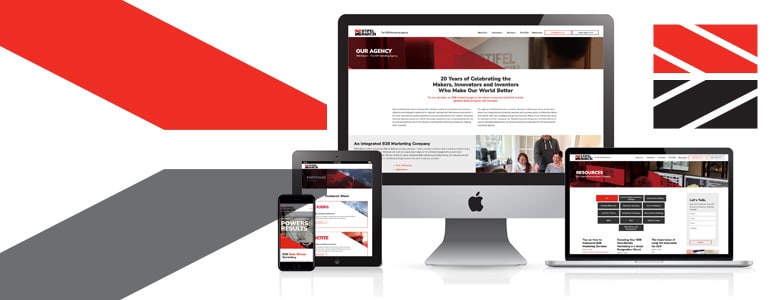Tips on How to Turn Your Existing Website into a Sales Generation Tool
In recent years the growth of digital engagement has grown dramatically, as have customer expectations for what a digital experience looks like. These changes have presented challenges for some B2B organizations, which have had difficulties integrating new technology into existing sales processes. With a systemic shift in the way organizations are doing business, B2B e-commerce platforms and strategies not only continue to rise in popularity, but in many cases have become a necessity.
Sixty-three percent of U.S. employees work remotely some or all the time, a number which averaged more than 40% even before the pandemic. This is fertile ground for B2B companies to reach target prospects.
Many manufacturers are in a unique position which allows them to turn their existing websites into B2B e-commerce tools – increasing their sales and supporting production lines. With people’s social and digital platform interactions being redefined, B2B marketers need to consider how their websites and lead pipelines can be reengineered to reach prospects and convert them to sales.
Set-Up Your Website for B2B E-Commerce Success
Now is the time for B2B companies to explore ways to make their website, and its e-commerce functions, user friendly. Most manufacturer sites are already rich with product details and the technical documentation that engineers and purchasers need. Whether you have an existing product database that supports your website content, or you have static content, many B2B organizations are in a unique position to integrate e-commerce functionality.
Work with your web development team and your sales team on ways to add e-commerce functions. Most often those additions will fall into two categories:
- A Fully-Integrated Online Store – WordPress (and other CRM platforms) can easily add-on e-commerce plug-ins and online shopping functionality. For some this may be a separate sub-domain which houses the purchasing function, and “bolts on” to your existing database and site. It leverages existing product features and data, and adds new capabilities. For those lucky few, adding e-commerce may be as simple as adding pricing to your existing product database. A fully-integrated online store will allow your website to become a top-producer, generating sales and processing orders with minimal effort from your staff.
- Shopping Carts without Purchase Functionality – building out a full product database, or adding the security and technical aspects needed for a fully-compliant e-commerce site, may be beyond your resources right now. However, consider ways to add in a shopping cart functionality that strips away some of those most costly functions – inventory management and purchasing data transfer. Perhaps a small section of inventory is listed online with prices, and manually updated, allowing customers with the most-commonly purchased parts to buy from a limited allotment. Or perhaps customers follow a traditional online store experience – putting their products into a shopping cart – but with a final step that simply emails an order form to a customer service team – allowing a person to collect personally identifiable information (PII) and complete the sales transaction manually. There are various ways to increase e-commerce functionality within the confines of your existing site.
The Rise of Resellers & An Amazon-Like Approach
While many manufacturers and B2B organizations have worked for years with distributors, there has been strong resistance – by some – to reseller platforms. Much of this resistance is well-deserved, and most of us marketing veterans have heard of problems with pricing and inventory management using outside resellers.
However, times are quickly changing, and the need to provide e-commerce solutions has become more critical. Platforms like Amazon have already primed themselves for increased activities in the B2B sector and have addressed (or at least made more apparent) the challenges faced by some manufacturers selling on their platform. For companies that don’t have the resources to build a B2B e-commerce solution internally, the proven technology and advertising capabilities of an organization like Amazon may be a good choice that will let you respond quickly to prospects’ demands for pricing, information and purchasing.
No matter what your opinion of companies like Amazon, many manufacturers will need to develop an e-commerce solution that prevents the loss a critical marketing share – because winning that business back from competitors who work with Amazon will be costly and difficult.
Make Your Website User Experience Customer & B2B E-Commerce Friendly
According to Garner®, approximately 77 percent of B2B customers find the typical buying process complex and difficult. When it comes to e-commerce for B2B websites, the customer journey needs to be user friendly, fast and clear.
First, this means building a website architecture that is understandable, easily navigated, and allows users to quickly find the right products and right information to support their purchasing decision. Product filters, clear categorization, and minimal clicks are key.
But, this also means establishing trust in your brand and transparency in your pricing, so that your target prospects are willing to complete B2B e-commerce transactions. Many B2B companies find online pricing difficult, often because orders are based on volume, and because detailed variables (sometimes which are apparent until late in the order process) affect total costs. But difficult does not mean impossible, nor does it mean it shouldn’t be done.
With the need for solutions for e-commerce for B2B rising, solutions that provide customers with an understanding of the variables that affect pricing may be enough. For others, this could be a simple scaled pricing model, where the prospect would get a general idea about costs and would then get a final quote from a sales representative.
Automated Increases to Support Customers
Very few B2B organizations can fully-eliminate the need for people in the sales process, even with the best e-commerce solution. As you build your e-commerce for B2B capabilities, look at how you will support customers during the purchasing process, both with order-related and technical questions. Often dedicating a small amount of human resources (sometimes even the same people who answer customer questions on the phone), can yield good return as large portions of the process remain in the e-commerce system.
The growing usage of chatbots will likely be important for many B2B e-commerce websites. Chatbots provide 24-hour service, instant responses, and gather information on your behalf. These functions are in fact robotic software, with algorithms that support data-based responses, identify customer needs and help with some common questions. As with B2C e-commerce websites, B2B e-commerce websites chatbots can provide detailed and specific information – such as available inventory, the projected date of completion, invoicing, account standing information, and all historical information related to an account. AI learning continues to advance these functions every day.
Customer Follow-Up & Nurturing E-Leads
To further enhance the customer journey, and ultimately increase sales conversions, B2B companies can establish interactions between ERP systems and e-commerce websites for clear visibility of customers’ orders. As you ramp up your sales via e-commerce solutions, B2B buyers will need support about their purchases. From communications about shipping times, invoicing and even follow-up communications on quotes that never turned into orders – relying on software to help improve the customer experience and follow up with leads can increase sales in the long-run.
Also, self-service online payment solutions for B2B buyers will be valuable. Emailed invoice reminders or online payment collection functions can help empower your target prospects to pay their invoices independently while reducing time-consuming work and manual order processing for your accounts receivable department.
Security & Compliance in B2B E-Commerce
As with B2C, B2B buyers need assurance that their personal and corporate data is protected. This means establishing best practices in security, maintaining every aspect of your website’s backend and processing functions, and internally controlling data access and operations to limit risks.
However, unlike B2C, B2B buyers have several compliance requirements when it comes to data handling. Proprietary drawings, protected business activities and projects must be protected – and you cannot always rely on your customer to comply with best practices.
B2B E-commerce sites must go beyond many B2C sites. From reminders about what information should and should not be offered in forms and submissions, to automated triggers that identify user requests and push different notifications to those customers (possibly directing them off the e-commerce site and to a direct contact at your company), B2B organizations must hold customer information and privacy to the highest standards.
Open for Online (B2) Business
Whether you are looking to increase the digital marketing that drives customers to your B2B e-commerce site, or you are ready to build out your online web presence with e-commerce functionalities, our team is here to help. With two decades of proven results, our integrated marketing solutions help manufacturers, medical device and industrial companies power up their marketing results.
Contact us today for a free consultation, and together, let’s work to grow your brand and sales.

Stifel Marcin – The B2B Marketing Agency
Unlike many advertising and marketing agencies, B2B isn’t just something that we do, it’s all we do. We’ll work to help your brand achieve its goals through the strategic combination of creativity, communication and technology. Our focused client intake processes give us the ability to thoroughly understand your business, products and objectives, working to identify the competitive advantages and opportunities that will grow awareness, leads and sales. We develop innovative marketing plans with strategic, data-driven processes, presenting complex ideas and compelling messages that position your business ahead of the competition. As your cooperative partner, our integrated B2B marketing agency is dedicated to your success. If you have questions about digital marketing and B2B e-commerce options, we’re here to help. Let’s talk.




